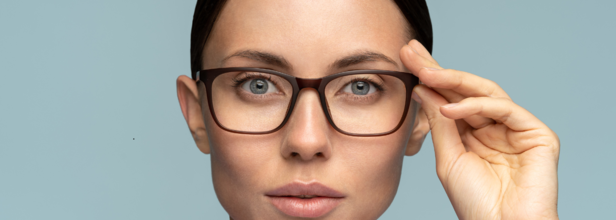- Health Conditions A-Z
- Health & Wellness
- Nutrition
- Fitness
- Health News
- Ayurveda
- Videos
- Medicine A-Z
- Parenting
Why Can't I Hear When I Take My Glasses Off?

Credits: Canva
I have been wearing glasses for as long as I can remember. To be specific, I started wearing my glasses when I was in first grade, now, in three months, I will turn 26, you do the math. One thing I noticed is that whenever I take my glasses off, I cannot hear anything clearly. It is not like I completely lose the sense of sound, but I won't be lying if I say, I struggle to understand what the other person is saying.
When I asked my friends who wear glasses, they shared the same struggle. Then I was loaded with such videos all over my Instagram, I also came across a few TikTok videos where people felt the same. This is what made me curious to know more about it.
To me this seemed unrelated, but as I read more, I realized vision and hearing are deeply connected. The brain integrates information from both senses and when visual input is disrupted, it can make processing sounds even more challenging.
The Link Between Sight And Sound
Studies have shown that out brain expects what we see to align with what we hear. A 2015 study in Scientific Reports explored this by testing participants in a dark room, either looking at a speaker or looking away. When their gaze was averted, their brains worked harder to process sounds, which led to a slower reaction.
Counselling Psychologist Nishi says, "This is a common multisensory experience where the brain relies on visual cues like lip movements and facial expressions to enhance speech comprehension. While the McGurk Effect demonstrates audio-visual interaction, this phenomenon is more about sensory integration and cognitive load. Without clear vision, the brain struggles more to process sound, especially in noisy settings, creating the illusion of reduced hearing."
What Is The McGurk Effect?
Researchers found that when a sound is paired with a mismatched mouth movement in a video, people often perceive a completely different sound—one that combines both inputs.
This effect highlights how much we rely on visual cues, like lip movements, to interpret speech. People who wear glasses may depend on these visual cues even more. When they take their glasses off, their ability to see facial expressions and lip movements is reduced, making it harder to understand speech.
"The brain combines visual and auditory cues to process speech, especially in noisy environments. When glasses are removed, visual clarity decreases, making it harder to rely on lip-reading and facial expressions. This increases cognitive load, making it feel like hearing is affected. It highlights how our senses work together to enhance perception," explains Nishi.
What Could Be The Other Explanation?
Studies also suggests that it is through the ventriloquism that connects the brain with sights and sounds. In a 2019 study, researchers showed participants visuals while playing sounds from different locations. The brain automatically linked the sound to what they saw, even when the two didn’t match.
This demonstrates that vision plays a key role in how we perceive sounds. If we suddenly lose clear sight—like when we remove our glasses—the brain may struggle to correctly interpret auditory signals.
Are There Ways To Train Our Brains To Not Rely On Visual Cues To Hear?
Interestingly, some may argue that removing glasses sometimes helps with hearing. However, as Nishi points out, auditory training exercises such as listening to speech without visual input, practising sound localization, and engaging in speech-in-noise training, can help strengthen auditory processing. However, since sensory integration is deeply ingrained, visual cues will always play some role in speech perception.
Nishi is a Counselling Psychologist & Mental Health Expert and is a Lifetime Member at the American Psychological Association (APA) Psychoanalytic Psychotherapist , Expressive Arts Therapist (UNESCO CID). She specializes in Trauma Informed Therapy and, hypnotherapy.
Health Warning For Vitamin D Users: These 4 Symptoms Are A Red Flag

Credits: AI Generated
The NHS is urging millions of people across the UK to take vitamin D to support overall health, but experts say certain symptoms should not be ignored. In a post shared on X, an NHS spokesperson said: “From October to March we can’t make enough vitamin D from sunlight, so to keep bones and muscles healthy, it’s best to take a daily 10 microgram supplement of vitamin D. You can get vitamin D from most pharmacies and retailers.”
While health professionals agree that vitamin D supplementation is important for many people, especially during the colder months, they stress that it should be taken carefully.
Why Does Sunlight Matter For Vitamin D Production?
Sunlight plays a crucial role in how the body makes vitamin D. UVB rays trigger a reaction in the skin that converts a compound called 7-dehydrocholesterol into vitamin D3. This form of vitamin D is essential for absorbing calcium, maintaining strong bones, and supporting the immune system.
As sunlight in the UK is not strong enough between autumn and early spring, the government advises everyone to consider taking a daily supplement of 10 micrograms, or 400 IU. Relying on food alone is often not enough to meet daily needs during this period.
Expert Warns Too Much Vitamin D Can Backfire
Biomedical scientist Tobias Mapulanga, who co-founded Repose Healthcare, has warned that some people may be taking more vitamin D than their bodies can handle. He explained that as winter advice circulates, many people add tablets, sprays, or gummies without realising they are doubling up.
He said that symptoms such as constant thirst, needing the toilet more often, nausea, stomach discomfort or constipation, headaches, mental fog, and new aches or cramps can appear soon after increasing vitamin D intake. These signs are often mistaken for winter illnesses, when they may actually point to excess supplementation.
“The message is simple,” he added. “The right dose helps, but taking too much can leave you feeling worse, not better.”
High-Dose Supplements Raise Safety Concerns
Research shows that 42% of UK adults reported taking vitamin D supplements in the past year. However, an investigation by Which? found some vitamin D products on sale contained doses as high as 12.5 times the recommended safe upper limit.
NHS England also logged 42 incidents over a two-year period where high-strength vitamin D was given more often than intended. Some of these cases led to hospital treatment for hypercalcaemia, a condition caused by too much calcium in the blood, according to reports from Bristol Live.
Stop Taking Vitamin D If You Notice These Warning Signs
1. Ongoing thirst and frequent trips to the toilet
If you suddenly feel unusually thirsty or find yourself urinating more often after starting vitamin D, it may be a sign you’re overdoing it. Cut back to a single 10 microgram tablet and stop using any additional vitamin D products if this happens.
Too much vitamin D can disrupt fluid and salt balance in the body, leaving you dehydrated and running to the bathroom. Check labels carefully and remove multivitamins, sprays, gummies, and fortified foods or drinks that also contain vitamin D.
Keep water close by and sip regularly while your body settles. Stay well below the upper limit of 100 micrograms, keep just one product visible, and put the rest out of sight to avoid accidental doubling.
2. Nausea, excessive burping, or stomach discomfort
Feeling sick, bloated, or dealing with an upset stomach after taking vitamin D suggests it isn’t agreeing with you. Try taking your supplement with a full meal and switch from sprays or gummies to a plain D3 tablet if symptoms persist.
Food helps protect the stomach lining, while sprays and gummies often contain sweeteners or flavourings that can irritate digestion. Choose a simple cholecalciferol tablet with minimal ingredients and reduce the dose to 10 micrograms.
Avoid fortified shakes or energy drinks until your stomach feels normal again.
3. New muscle cramps or bone aches
If you notice more aches in your bones or frequent muscle cramps after starting vitamin D, take it as a signal to reassess. Lower your dose and focus on staying well hydrated while eating mineral-rich foods.
Excess vitamin D can interfere with mineral balance, which muscles rely on, and dehydration can make cramping worse. Drink water with meals and include yoghurt, leafy greens, beans, and bananas in your diet.
Gentle stretching and short walks can ease stiffness. Stick to one 10 microgram supplement and avoid adding anything else until symptoms improve.
4. Brain fog or headaches
Trouble concentrating or recurring headaches can be signs that your vitamin D intake is too high. Replace multivitamins or high-strength products with a single 10 microgram D3 tablet.
High doses can raise calcium levels, and extra additives found in combined supplements may affect clarity of thought. Choose a product that contains only cholecalciferol and basic fillers.
Take it with food at the same time each day for consistency and better digestion. Avoid combined vitamin A and D products and focus on one simple supplement.
To prevent accidental overuse, review everything you take that contains vitamin D. Spread out all tablets, sprays, gummies, and fortified foods, and read each label carefully. Convert IU to micrograms by dividing by 40 to make totals easier to track.
Discard any extras and stick to one daily 10 microgram source. Keep a note of symptoms such as thirst, frequent urination, stomach upset, cramps, or mental fog to see how they relate to your intake.
Is Iodized Salt Enough To Keep Your Thyroid Healthy? Doctor Explains

Credits: AI Generated
For decades, iodine deficiency was a serious public health concern in India. Conditions like goitre and other iodine-related disorders were widespread until the nationwide introduction of iodised salt changed the picture. The move is widely seen as a major health success, preventing thyroid problems on a large scale.
Due to this, iodine has come to be almost inseparable from conversations around thyroid health. While its role is vital, doctors now caution that focusing on iodine alone can give a false sense of security.
“The thyroid is often misunderstood as a simple gland that switches on with iodine,” says Dr. Narendra BS, Lead Consultant – Endocrinology and Diabetology at Aster Whitefield. “In reality, it is a complex hormone-producing system that depends on several nutrients and physiological processes working together.”
Thyroid Does Not Run On Iodine Alone
The thyroid gland produces hormones that regulate metabolism, energy levels, body temperature, and even mood. Iodine is required to make these hormones, but it is only one step in a longer chain.
According to Dr. Narendra, problems can still arise even when iodine intake is adequate. “Hormone production and activation involve multiple stages. If other nutrients are lacking or the body is under stress, thyroid function can suffer despite normal iodine consumption,” he explains.
Nutrients That Quietly Support Thyroid Function
Several nutrients play supporting roles in keeping the thyroid healthy. Selenium is needed to activate thyroid hormones into their usable form. Iron is essential for hormone production itself, which is why thyroid disorders and anaemia often occur together. Zinc contributes to hormone synthesis, while adequate protein levels help transport thyroid hormones through the bloodstream.
“When these nutrients are missing, patients may continue to experience symptoms even though they are using iodised salt regularly,” Dr. Narendra notes.
Diet Patterns Matter More
Modern eating habits can also place strain on the thyroid. Very restrictive diets, frequent meal skipping, or cutting out entire food groups can disrupt hormonal balance. Diets heavy in ultra-processed foods may increase inflammation and worsen overall metabolic health, indirectly affecting thyroid function.
“A varied, balanced diet supports not just the thyroid, but the entire endocrine system,” says Dr. Narendra. “Nutrition should be looked at as a whole, not reduced to a single nutrient.”
Lifestyle factors often overlooked in thyroid care include stress and sleep. Chronic stress and poor sleep quality can interfere with how thyroid hormones are converted and used in the body.
“This is why some people feel unwell despite having ‘normal’ thyroid blood test results,” Dr. Narendra explains. “Stress hormones can mask or worsen symptoms, making the problem harder to identify if we focus only on iodine levels.”
When Salt Alone Is Not The Solution
Many people turn to iodised salt hoping it will ease fatigue, weight gain, or hair loss. While correcting iodine deficiency is important, these symptoms are frequently linked to broader thyroid disorders, including autoimmune conditions, which require medical evaluation and proper treatment.
“Iodised salt prevents iodine deficiency, but it cannot correct poor diet, chronic stress, sleep deprivation, or undiagnosed thyroid disease,” Dr. Narendra cautions.
Iodised salt is a starting point, not a complete solution. It plays a crucial role in preventing iodine deficiency, but true thyroid health depends on balanced nutrition, healthy habits, and timely medical care. The thyroid needs more than what comes from the saltshaker to function well.
If You Take Omeprazole Or Metformin, This Common Deficiency Could Be Affecting You

Credits: Canva
A pharmacist has warned that people taking certain long-term medications should stay alert to subtle symptoms such as numbness, tingling, and an unusually red or sore tongue. According to Superdrug Pharmacy Superintendent Niamh McMillan, as per Mirror, the signs are often easy to dismiss and may quietly develop over time in people with low vitamin B12 levels.
Pharmacist Warns Certain Medicines May Trigger Overlooked Vitamin B12 Symptoms
McMillan explained that vitamin B12 plays a vital role in keeping nerves and blood cells healthy. A shortage can build up slowly, which means early symptoms are often brushed aside or mistaken for everyday fatigue.
She said common warning signs include persistent tiredness or weakness, breathlessness, headaches, dizziness, pale skin, and a sore or red tongue. Some people may also notice pins and needles or numbness in their hands or feet, memory lapses, trouble focusing, or changes in mood such as feeling low or unusually irritable.
Who Is Most At Risk Of Low B12 Levels?
Vitamin B12 deficiency occurs when the body either does not get enough of the vitamin from food or struggles to absorb it properly. McMillan noted that people following vegetarian or vegan diets are at higher risk, as B12 is naturally found mainly in animal products.
Older adults are also more vulnerable, as are people with digestive conditions such as coeliac disease or Crohn’s disease. In addition, those taking certain medications may be affected, particularly long-term acid-reducing drugs such as proton pump inhibitors or diabetes medication like metformin.
Dietary Sources That Help Maintain B12 Levels
To reduce the risk of deficiency, McMillan advised including reliable dietary sources of vitamin B12 wherever possible. Foods naturally rich in the vitamin include meat, fish, eggs, milk, cheese, and yoghurt.
For people who avoid animal products, fortified foods such as some breakfast cereals and plant-based milks can help support intake. In some cases, supplements may also be useful, especially when diet alone is not enough or absorption is impaired.
When To Seek Medical Advice?
McMillan stressed that anyone experiencing symptoms or falling into a higher-risk group should speak to a healthcare professional. A simple blood test can measure B12 levels, and early treatment can help prevent lasting nerve damage or other complications.
She added that Superdrug Health Clinics offer a Vitamin B12 Injection Service at selected UK locations, following clinical assessment or confirmation of deficiency.
How Medications Can Interfere With Vitamin B12?
Several commonly prescribed medications can affect how the body absorbs or uses vitamin B12. This often happens because the drugs alter conditions in the stomach or gut, making it harder for B12 to be released from food or absorbed into the bloodstream.
Medications Linked to Vitamin B12 Deficiency
The most frequently associated medications include:
- Proton Pump Inhibitors (PPIs): such as omeprazole, esomeprazole, and lansoprazole
- H2 Blockers: including famotidine and cimetidine
- Metformin
- Oral contraceptives, although experts continue to debate whether these cause a true deficiency
- Colchicine, used to treat gout and known to damage the intestinal lining
- Anticonvulsants, including drugs like phenytoin and phenobarbital, which can affect B-vitamin metabolism
- Nitrous oxide, commonly known as laughing gas, which can rapidly inactivate existing B12 in the body
- Antibiotics, particularly long-term use of chloramphenicol or neomycin, which can disrupt gut bacteria involved in B12 processing
What To Do If You Take These Medications Long Term?
Experts advise people on these medicines not to stop treatment without medical guidance. Instead, they recommend staying alert for symptoms such as fatigue, tingling or numbness in the hands or feet, brain fog, or a sore, red tongue.
Getting tested is also key. A straightforward blood test can confirm B12 levels, and many doctors now suggest regular screening for patients who take metformin or proton pump inhibitors over extended periods.
© 2024 Bennett, Coleman & Company Limited

